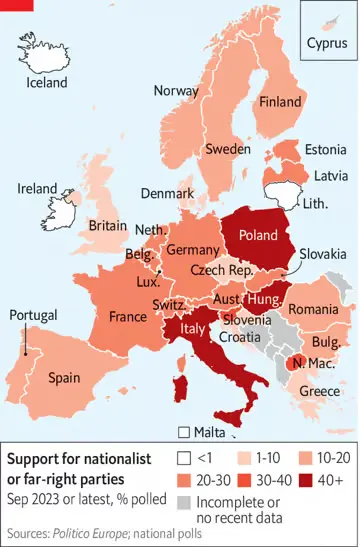Far Right Politics Spreading Across the West
The trend shows no sign of abating.

The Economist reports, “The hard right is getting closer to power all over Europe.” After an anecdote about the growing popularity of a Flemish nationalist party in Belgium, they observe,
It is a common pattern. Across much of Europe, populist right-wing parties like Vlaams Belang, once relegated to the fringe, are going from strength to strength. In Hungary, Italy and Poland they hold power. In Finland, Sweden and Switzerland they have a share of it. In Germany polls put the Alternative for Germany (afd) party at 22%, up from 10% in the election in 2021. In France the National Rally (rn), the biggest hard-right party, has 24% support. Add in 5% for Reconquest, another anti-immigrant party, and the hard right becomes the biggest voting block in the country. In the Netherlands, too, a smattering of right-wing populists claim a quarter or more of the vote. Even newish democracies that for decades lacked big nationalist parties—Portugal, Romania and Spain—now have them.
This is followed by several important caveats:
The advance of the hard right is neither uniform nor one-way. Support for populist nationalists has recently slumped in Denmark and Spain, for instance. Nor are all these parties the same: some are eager Atlanticists, others pro-Russian; some are libertarian, others want a more generous welfare state, albeit only for people of native stock. What is more, hard-right groups tend to mellow the closer they get to power, or to splinter, or both. The government of Italy, for one, although led by the Brothers of Italy (fdi), a party with links to fascism, has proved much more moderate than many had feared.
Like “populist,” “hard right” seems a bit hard to pin down.
Nonetheless, the trend is alarming, for three reasons. First, it is remarkably broad. Four of the five most populous countries in the European Union have hard-right parties either in government or polling above 20% (see map). Second, the current circumstances are especially propitious for populist parties, with immigration rising after a hiatus during the pandemic, inflation high and the growing cost of climate policy creating a potent new focus for popular ire. Third, and most important, the hard right does not need to win power to have a baleful impact on politics. Simply by attracting a big share of voters, it is already skewing the debate, and so making it harder for European governments to adopt sensible policies on pressing problems, such as the war in Ukraine, immigration and climate change.
The map in question:

The trend has been growing for some time:
When the Freedom Party, Austria’s main hard-right outfit, joined a coalition government in 2000, other eu governments were so horrified that they reduced contact with Austria’s to the bare minimum in protest. To no avail: the hard right has since broken through barrier after barrier. It first led a government in 2010, when Fidesz, a once-centrist outfit that had taken a populist turn, swept to power in Hungary. Those who said the same thing could never happen in mature democracies in western Europe were proved wrong last year when fdi took power in Italy.
More milestones loom. Hard-right parties are expected to do well in next year’s European elections. Giorgia Meloni, the leader of fdi and prime minister of Italy, is trying to persuade the centre-right alliance in the European Parliament, the European People’s Party (EPP), to join forces with the hard-right European Conservatives and Reformists (ECR), which she heads. That would move the legislature of all of the eu in a populist direction. In France, meanwhile, the hard right’s performance is improving at each presidential election (see chart). It is possible that Marine Le Pen, the runner-up at the past two contests, may win the next one, in 2027.
While “far right” is rather an elusive concept in terms of policy preferences, nativism seems to be a core component.
A series of external factors are helping to propel support for the hard right. Illegal immigration, which spurred support for populist parties when it surged in 2015, is growing again after a lull during the pandemic. There have already been more than 165,000 unauthorised arrivals in Europe this year, as many as in all of last year, although still well below the level of 2015. Populists also tend to do well in times of economic upheaval, and so are benefiting from the high inflation that has plagued Europe for the past two years, and especially from soaring energy prices.
Expensive petrol, heating and electricity have helped foment a backlash against policies to fight climate change, which the hard right has seized on. This began in France with the gilets jaunes movement in late 2018, initially a protest against a carbon-tax hike on motor fuel. The afd’s rise this year was touched off by a proposed government ban on oil and gas boilers in homes. In the Netherlands the Farmer-Citizen Movement (bbb), a new populist party, began as a farmers’ protest against nitrogen-emission limits. It won an astounding 20% of the vote in regional elections in March.
There has also been a broader slide in trust in government in many European countries, after a brief resurgence during the pandemic, to the benefit of the hard right. American-style culture wars are becoming fiercer, too, which, again, helps the populists. Maximilian Krah, the afd’s lead candidate in the European elections, went viral over the summer with dating advice posted on TikTok: “Real men are right-wing. Don’t watch porn.” In other videos Mr Krah argues that “multicultural means multi-criminal”, bemoans rainbow flags and warns that BlackRock, an investment firm, wants to replace Germans with “minorities and immigrants”.
The European politician most adept at exploiting such ideas to win and hold power is Viktor Orban, Fidesz’s leader and the prime minister of Hungary since 2010. He readily bashes migrants, gay people and the eu as at odds with homespun Hungarian values. He has used the parliamentary majorities he has won with such talk to pack the courts with loyalists and gerrymander the electoral system. Cronies have bought up critical media outlets. In addition to undermining democracy at home, Mr Orban’s rule has scrambled policymaking at nato and in the eu, owing to his friendliness with both China and Russia.
And yet:
But harnessing right-wing populism to take control of a state is not easy. When Poland’s Law and Justice (pis) party came to power in 2015, it followed Mr Orban’s script. It turned the state media into a propaganda bureau and tried to pack the courts. But pis’s efforts have not got as far as Fidesz’s. Many judges have fought back, and the eu has withheld billions of euros in aid to force pis to reverse some of its court-packing. The media have not been cowed. The opposition remain competitive, even though pis is favoured in next month’s election.
Other right-wing populists using Mr Orban’s template have also had mixed results. Janez Jansa, a former prime minister of Slovenia nicknamed “Marshal Tweeto” for a social-media style reminiscent of Donald Trump, lost power in 2022. Estonia’s far-right ekre party tried to go after the media while in government in 2019, but that coalition collapsed and the party did poorly in an election this year.
Even where it has been electorally successful, the hard right has struggled to put in place radical policies such as ending political asylum or scrapping measures to reduce greenhouse-gas emissions. Take Sweden, where the Sweden Democrats, long shunned by other parties because of their roots in the neo-Nazi movement, took 21% of the vote in 2022. They signed a confidence-and-supply deal to back a centre-right minority government, giving them direct influence over policy on immigration and crime. But in a speech in August Jimmie Akesson, the party’s leader, had to make excuses for the government’s slow progress implementing the deal.
Ms Meloni is the first leader in western Europe with the parliamentary clout to enact a hard-right agenda. Yet so far, she has run a fairly conventional government. Her only populist measures have been to introduce a misconceived tax on banks, limit some airline fares and prevent same-sex parents from registering their partner’s child as their own. In part, she is constrained by European fiscal rules. But the fdi is also simply less extreme than it once was. ”This is a pragmatic centre-right government with, now and again, some identitarian [culture-war] policies,” argues Giovanni Orsina of the luiss school in Rome.
On the question of Europe, in particular, many hard-right parties have softened. A few of the edgiest populists want to dismantle the union they sneeringly refer to as the “eussr”. But fdi abandoned the idea of leaving the euro and restructuring the eu before coming to power. Ms Meloni instead wants the eu to do more to help Italy, by keeping out the migrants that flood Italy’s shores. This summer she went to Tunisia with Ursula von der Leyen, the European Commission’s president, to negotiate a migration deal. She also wants the bloc to relax its fiscal rules so that her government can spend more. She even cultivates Europhiles by praising the union as the guardian of European peace and civilisation.
The rn, in similar fashion, no longer calls for France to leave the eu and the euro. Its rhetoric remains anti-European, but with few specifics. This retreat from more radical policies was presumably intended precisely to broaden the rn’s appeal and so help it win power. And even if Ms Le Pen were to become president, she might still struggle to implement her policies, despite the immense formal powers of the office. After all, reforms to state pensions championed by Emmanuel Macron, the incumbent, met ferocious opposition even though he clearly advertised them during his re-election campaign last year.
This is rather paradoxical, no? The far right has grown more powerful but, as it has done so, it has become, well, less far to the right?
Far-right parties, which are often young, full of zealous ideologues and dependent on charismatic leaders, are prone to schisms. The Finns Party’s first stint in government, in 2015, split it in two. Its second, which began in May, has already been marred by scandals and resignations. In Poland, pis’s generous benefits policies have alienated fiscal conservatives, some of whom have defected to a libertarian party called Confederation. Ms Le Pen, having softened her radical image, now faces competition on the right from Reconquest, whose lead candidate in the European election is her niece, Marion Maréchal.
The most vivid illustration of such chaos is in the Netherlands, which since 2002 has seen a series of right-wing populist parties rocket to prominence only to implode. In provincial elections in 2019 Forum for Democracy, a party led by Thierry Baudet, a dandyish Eurosceptic, finished first with 17%. Within months it had split into three. Mr Baudet now hawks conspiracy theories about covid-19 and immigration; his rump of the party is polling at 3%. Earlier this year the bbb had a brief moment as the standard-bearer of the right, but it has already slumped to 11% in the polls. It has been losing votes to yet another new party on the right with populist overtones, New Social Contract, which was launched by an mp famous for investigating abuses by the tax authority.
We’ve certainly seen some of this in the US, with the Tea Party and, eventually, MAGA rising partly in frustration with a Republican Party that governed in a more centrist manner than it campaigned. This is even more likely in Europe, which is more pluralistic in its institutions. Coalition building is simply required to hold power.
Another commonality:
What all these parties have in common is a vague sense that they stand with ordinary people against the elite. Their positions on hot-button issues can be hazy, as with the RN’s new stance on Europe. At a local level their candidates are often pragmatic.
And this:
The changes Europe’s populist parties rail against tend to be inexorable or at least not easily reversed: demography, sexual liberation, gender equality, the shift away from fossil fuels. As with Vlaams Belang, the policies they propose to set the world to rights tend to be incoherent or unachievable. For populists, unrealistic programmes are no bad thing: candidates cannot thunder indignantly at election rallies about problems that have been solved.
Moreover, simply by railing and attracting support, far-right parties help to shift the debate. All across the continent, centre-right parties have toughened their immigration policies and heightened their culture-war rhetoric to stop voters defecting to the populists. The most glaring example of this was in Britain, where Brexit was set in train by the Conservative Party’s decision to support a referendum on Brexit in an effort to diminish the appeal of the insurgents of the uk Independence Party.
This is probably the biggest risk of the rising vote share of Europe’s far-right parties. Certainly, they tend to be associated with bigotry and misogyny, and to undermine the rule of law. Occasionally they may win enough power to damage democracy, as in Hungary and Poland. But more often, big populist-right blocs simply impede countries from getting to grips with their most pressing problems by offering illusory solutions.
That is the last thing the eu needs. The next European Parliament must make grave decisions regarding institutional reform in the eu, energy security, climate, support for Ukraine and more. If a quarter of its members refuse to wrestle seriously with such problems, they are unlikely to be solved. The hard right does not need to seize control of the levers of power to gum them up
People being fearful or angry about social change is perfectly understandable. So long as it’s expressed within the bounds of the law and democratic norms, it may even be a healthy check.
But, aside from a tendency toward violence and democratic backsliding, there piece gets at a more fundamental issue: these movements are often based on resentments rather than policy preferences. Oftentimes, they just want leaders angry at the same forces that they are. Indeed, there often are no solutions to be had to the problems they’ve identified.






This is a point I keep trying to get across about a major flaw in US institutions.
First, because we have two large parties, there is no need to form coalitions to govern (although sometimes there are some coalitions that emerge around specific legislation).
Second, while our parties are coalitional in nature, they do not have consensus-building mechanisms that require the broader coalition to be in agreement with candidates and platforms. Instead, the primary system can allow one segment of the coalition to take over the whole thing (e.g., Trump) or allow for such a fragmented process (e.g., individual congressional districts) that you get what are seeing with the House GOP.
Third, because of point two, it is far easier in the US than in Europe for a far-right faction to take over a major party, and to then control some, or all, of the national government.
(BTW: one of the examples of far-right control in Europe, Hungary, also has rules that amplify the power of numeric minorities over the majority largely by over-representing rural areas of the country).
Now put North America on the map.
First, a reminder that “populism” is really just a method of drawing a boundary around some group of people and declaring them “The People” while everyone outside the boundary are UnPersons, who are unworthy of equality or fair treatment.
This has to be repeated, because often media outlets and ordinary people give a rosy glow to the word, assuming it somehow means something about the little guy against the powerful.
Second, the recent developments demolish the theory that fascism arises only in times of economic distress and chaos. What this era of fascism demonstrates that it is in response not to economic distress, but cultural change by changing ethnic landscape.
This is important, because it illustrates why “compromise” is impossible. If the generating anger is due to the influx of a different ethnic group, its not like the new group can just change their ethnicity in order to compromise.
Also: populism can be from the left and from the right (or even, I suppose, from the “center”).
I may be whistling past the graveyard, but I see this more as a last gasp than a true resurgence. The boomers are desperately clinging to power by any means necessary before the power shifts to the millennials and zoomers.
A Nazi version of King Canute standing on the shore ordering the demographic tide not to come in.
@Stormy Dragon: Sure hope you’re right. In Europe and here. For the voters it’s clearly a rear guard action against cultural change here, but if they get on top, they’ll take steps, like Orban’s, to make it hard to get rid of them. But it’s not so much our authoritarians would copy Orbán as Republican consultants showed Orbán how to do it. Orban has been supported by GOP consultants, and often funded by the same Billionaire Boys Club donors as the GOP.
Despair dot com got it right:
They applied it to consulting but it rings true for a lot of politicians and soul-less political spin doctors as well.
@Stormy Dragon: We’ll see, I guess. Right now, the power in this country is mostly held by the pre-Boomer Silent Generation. Biden and McConnell were both born in 1942—four years before the Boomers. And the youngest Boomers, born in 1964, are their kids. And, once again, we Gen Xers (1965-1979) get skipped over entirely!
@Chip Daniels: Utter bollocks.
First, the rise of populist right-side reaction in Europe in now way “demolishes” any such observation, the rise of reaction mapping quite well with rising inflation and moments at national or European level of combined economic and cultural stress – comparative to the preceding period. Of course if one has an impoverished understaning of both present Europe and European history, yes it does not look like 1933, but of course 30s fascism arose and accelerated in the economic stress and change of the 20s.
And further is was a priori exclusion of compromise in the European case – both by Left and traditionalist (versus populist) Right that helped see success of actual fascism in the 30s. The traits of intell0 professionals purity pony errors one can see reproducing themselves now as in the 30s.
Political activists despise compromise, it is a rule, and but systems generating it allow evolution – the European compromises on climate policy seem to be this in slow motion and live, as an example, where reaction on anti-fossil fuels contra USA is not clearly more an issue of panic over real up-front investment cost (and frankly unrealistic goal setting by cubicle people in Brussels) and inflation than any ideological attachment, different than USA if one reads correctly.
@James Joyner: ;@Stormy Dragon:
Your American Generations analysis is completely empty innumerate bollocks, it’s painful to read. Age cohorts have limited internal coherence, and only within socio-economic strata. The problem you lot have is you reify the very visible – as highly verbal activist – Uni urbanised and educated youth fraction that falls into a Left leaning or liberal-Left leaning spectrum – where regional geographic and socio-economic class differentiation is needed. I recall as – to use the utterly analytically empty category “Gex-X” the American journos positioning of the ‘Boomers” as inherently more Left (and the Gen-X being more conservative) – a socio-economic analysis error from you people mistaking bad marketing rules of thumbs as actual valid socio-political anlaytical categories.
Just a couple of general points.
First, how one defines “hard right” and “far right.” These are one of a number of annoying terms that no one bothers to define, yet are thrown around more as vague pejoratives than actual descriptors. If anything, using them is in-group signaling. So I think using them ends up saying more about the worldview of the Economist (a source I love, BTW), than it does about what’s actually going on with populist movements in Europe.
For example, if you’re going to lump everything ranging from libertarians to socially conservative statists into the same “hard right” camp, then it seems to me there’s an obvious definitional problem. The same could be said with all the various adjectives used in this piece – what is “radical” or “extreme” is subjective and depends on where you sit – these are descriptors that say more about the person using them than what they are ostensibly describing.
Secondly, as I often point out here, the countries in Europe are very different from the US in that they are largely cultural and ethnic nation-states, while the US is a political union. This is why Europe is going to have long-lasting problems with immigration compared to the US.
France is a good example – the French have long been pretty open in their hardcore cultural nationalism. They are willing to accept foreign peoples as long as those people adopt the French language and adhere to French cultural norms. In short, the French expect you to become French to really be accepted. The problem, of course, is that many immigrants don’t want to do that. They don’t want to become French, they want to live in France or change French culture and norms to more closely resemble or be more accommodating to theirs. The French do not want a melting pot, hence France’s continued efforts to double down on secularism (among other things) which many immigrants naturally oppose.
Sweden is another example. The native Swedish population is beginning to turn against immigrants who, unsurprisingly, are unwilling to become “Swedish.” Immigrants don’t want to do what the Swedes want and leave their cultural values and practices behind and adopt Swedish norms.
And this isn’t just about “brown” people – a lot of Brexit sentiment was fueled by Eastern Europeans (especially Poles) coming into the UK. Whether real or not, the perception was that these “low-cost” workers would displace the native workforce. And the UK has long had the cultural idea that it is separate and distinct from the “continent.”
So, I think a lot of these nationalist movements in Europe and elsewhere revolve around three things:
– Preserving the cultural and ethnic identities of ethnic nation-states that have been, until relatively recently, largely homogenous.
– The economic conditions of the non-elite working class, particularly those economically vulnerable to globalization and competition from low-skill immigrant labor.
– There are also the issues of loss of national sovereignty and economic divides within the EU, the latter largely born out of the EU being a monetary but not a fiscal union.
I don’t really see a solution to these disputes anytime soon, so I’d expect things to get more divisive before they get better.
@Lounsbury:
Well, I think the evidence is pretty conclusive that there are generational differences. I don’t think such differences can be neatly pigeonholed into ranges of birth dates, but they do exist.
Here in the US, at least, the effects of technology and circumstances are the driving factors. People who grew up in the Great Depression listening to radio are going to be different that the generation that grew up with increasing wealth and television. The people of my generation – Gen-X grew up with inflation, Reagan the rise of computers, and the end of the Cold War.
The conditions and technology under which a cohort of people comes of age do have non-trivial effects, IMO, that allow some degree of categorization.
@Lounsbury:
“Fascism also arose in the boom period of the 1920s” isn’t quite the riposte you think it is.
But ascribing it to what you delicately term “cultural stress” is something I would agree with and indeed is central to my point.
@Chip Daniels: You are so right. It’s Culture. When the myths are proven to be untrue and the taboos are shown to be natural human expressions then the “safe” world begins to crack. Despair, anger and depression become common and reactive violence toward others and to oneself in the form of drugs, alcohol and isolation are the result.
@Andy: I agree with you about the inadequacy of the terms. What alternative descriptor would you propose for those parties/movements that feature both (1) nativism restricted to a privileged ethnic group and (2) discrimination against all sexualities other than strict hetero? The two do seem to go together more often than chance would predict, so a common cause seems likely.
Some people just like to believe that the power of state can make things like a humanitarian crisis or the existence of gay people vanish. They like to believe that being harder on criminals will make crime go away. These people also tend to believe that the state is telling them they don’t count if they see a refugee selling candy or a homeless person in an ATM vestibule. The existence of other people equals their status as an insect. They are a mass of people (mostly little, and with valid grievances about that status) waiting for a leader to make them big.
That’s why Putin has so many defenders talking about how Ukraine was an ‘existential’ threat. That’s the threat that gets them: not the real threats of daily life but the one which makes you a patsy, a bug.
@DrDaveT:
On the first, “nativist” seems like the obvious choice given the plain definition of the word. On the second, I would probably use heterosexism, although that term seems to have fallen out of fashion.
@Lounsbury: Amazing word salad! Gustopher may have to shift into overdrive to replicate this one!
@Andy:
Wait til you hear about indigenous people in Sweden. For instance, the campaign to eliminate the Sami as a distinctive group.
I don’t want to spoil anything for you, but the notion of Sweden as a homogeneous society that was doing great before foreigners started disrupting everything with their foreign ways… not 100% accurate.
The path of the fratelli in Italy is interesting.
They started out as “populists” (for the usual arbitrary value of “populist”)
But as they are now in power, they are shifting to, more or less, the normal right-of-centre positions and policies of the Christian Democrats.
The realities of actual practice policy, and the need to co-ordinate with public and private decision makers, means it is rather difficult for would-be populists once in government, to stake out a genuine “alternative” policy position, as opposed to channeling “the grump” in election campaigns.
Hungary is a bit of an outlier, as the Fidesz political model depends upon redirecting EU money to its clients, while sticking a finger up to the EU. A ploy rather dependent on EU institutional legalism.
And the UK is a different but related, case .
Other right-populists have no problem being more pragmatic (see Italy and Poland).
It’s actually rather difficult to determine exactly what a right-populist position is, or may be, in various European countries.
@Gustopher:
“…indigenous people in Sweden…”
That’s a thorny topic.
The Sami are indigenous to Sweden; but arguably, so are the (Teutonic) Swedes, at least as far back as the first millennium BC.
Similar applies to Finland with Suomi vs Sami vs “Finnish Swedes”, not to mention Russians.
@Lounsbury:
Never mind the bollocks, Messrs. Rotten, Vicious, et al. productionized ironic Nazi imagery conjoined with explicit anti-fascist rhetoric seasoned with expletives, exploiting intello journos pedestrian desires both to have and to hold dessert toppings and floor waxes. Intello bobo Bowie scribed, in the machinations of tin rather than his personage as the thin white Duke of Stardust, “fascist flair is fashion cool,” during that awkward season when everyone was posturing as punk.
Ironic that Lefty wankers would mistake the genuine Nazi imagery and ironic antifascist lyrics for the converse, a McClaran triumph of style over substance as no more genuine genuflections passed through the filthy teeth of Johnny than “God save the Queen and her fascist regime!”. Those Indians wank upon their bones. Vivek, I edge to you.
Conservators of culture congregate in clubs, by George, standing down and standing by their man, in a game of both hunger and crying of the populi and the ivory towers respectively. Giant elephantine phalluses rise to lofty heights from which the restless rabble are indistinguishable from John Merrick, forests are indistinguishable from trees, and men are indistinguishable from women, leading to the ocularly impaired leading the ocularly impaired whilst the wet bulb Bobos critique their performance favorably.
Charlatans, Charlemagne and King Charles, chestnuts roasting on an open fire.
@JohnSF: An incredibly thorny topic of which I know just enough to know that the conservative talking points of ethnically and culturally homogenous Nordic counties is bullshit.
@Gustopher:
I can’t stop laughing.
@Gustopher:
The Sami population is something like 0.2% of Sweden’s population. If you want to nitpick Sweden’s comparative homogeneity, feel free, but this is not a good example to make. And, as JohnSF points out, the “Scandinavians” have been living there as long or longer than the Sami.
And none of that addresses my core point about the difficulty of ethnic nation-states regarding immigration. Native populations want to keep the national character and culture of their country. I don’t want to spoil anything for you, but that doesn’t just apply to European nation-states.
A week ago Dr. Taylor had a post on an Atlantic article and book by Steven Levitsky, and Daniel Ziblatt, Tyranny of the Minority.
One should note that this was unusual. In most states the Populists were as racist as everyone else. Also, if I remember Jamelle Bouie correctly, The Fusion was founded in the small town that is home to the “Rich Men North of Richmond” guy, who seems to have fallen out of the news since he asked Republicans not to use his song, since he meant them too.
Levitsky and Ziblatt talk about The Fusion after discussing Orban. They talk about the methods Orban uses and in a chaper titled It Has Happened Here show how the Demoratic establishment in NC used all of Orban’s techniques against The Fusion. And when that wasn’t enough the Wilmington Insurrection of 1898 destroyed any vestige of Black political participation in NC.
My point is, as @Steven L. Taylor: says, “populism” is not synonymous with “hard right” or “nativist”. It seems to usually be a fraud, what Martin Wolf calls “pluto-populism”. But it doesn’t have to be.
@Gustopher: This is art. Lol
@Andy:
I was unclear — I’m looking for a term to describe the combination of those two. It seem to be what “hard right” often means, but I’d rather be more precise. Heteronativist?
@JohnSF:
Nativists are people who hold the silly belief that modern borders should align with antique tribal identities, and that their tribe is the one that “owns” the modern nation. It’s particularly absurd in North America, where the question of which set of conquistadors is the legitimate one can only provoke snerk.
@Andy: These phenomena manifest everywhere, and can be political, economic, or cultural.
Here in New Hampshire, for instance, natives of this state frequently ask people coming from places like Massachussetts (high taxes) why they would come here because they didn’t like where they were, but then proceed to try to remake “here” to be more like “there”.
We also have libertarians here who would like to kick everyone who does not agree with them out of the state.
It all gets quite muddled.
@DrDaveT:
I don’t think there is one and would argue it’s usually better to spend a sentence or two describing the characteristics of a party, movement or government rather than rely on vague terminology.
And there are a lot of governments in the world that are both nativist and hostile to modern secular progressive ideas of gender and sexuality. If that’s going to be “hard right” then we’d need to label much of the world with that term. Again, to vague to be useful.
Well, the reality is that is the way the world works. A nativist sentiment is the foundation for modern states, and human social organization generally. There’s a reason why no country in the world is willing to allow anyone or any number of people to enter, much less stay. Chances are, you are no less tribal than anyone else, it’s just that your ingroup and outgroup are different.
@Polimom:
I agree. Here in Colorado, locals complain about Texans and Californians.
It’s how humans socially organize – it’s inevitable that ingroups and outgroups are created. To be accepted in the ingroup, one is expected to adopt the ingroup norms. It’s the basis of partisanship and is particularly strong there. It’s even the basis of sports rivalries, which gives an outlet for this behavior.
@Andy:
Um, that’s why it would be useful to have a term for it?
I think this is wildly false. Or, rather, it was historically true of how modern nation-states (other than Germany and Italy) originally organized, but has not been true of any major world nation for centuries. Only nativists believe it is still true of their nations. Indeed, the irreconcilable differences between ethnic demography and national borders is the key factor in the endless problems for Basques, Kurds, Sikhs, Catalans, Palestinians, Ukrainians, Serbians, Sami, Finns, Irish, hundreds of indigenous populations in the New World, and on and on and on. These are not (merely) immigration-driven issues; they were baked into the founding populations of these nations.
@DrDaveT:
Sure, if everyone could agree on a single word for that. I don’t know what that word would or should be. If you want it to be “hard right” then you’d need to convince the Economist and others to stop using it as a subjective catchall.
And the world has a shit-ton of nativists. The reality is that every country is nativist to a certain extent for reasons having to do with a desire to preserve the character, culture, values, economy, or whatever. This is why there is growing opposition to immigration in European nation-states – the latent nativism is coming out.
Irreconcilable differences between ethnic demography within existing states is related as another aspect of the same tribalism that underlies both that and nativism. And these often directly overlap. Look at the Balkans where the states that now exist following the breakup of Yugoslavia engaged in ethnic cleansing and are also highly nativist, particularly against the populations that were cleansed.